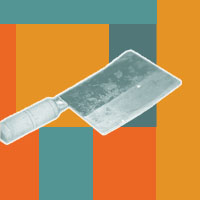Each Friday, the Heavy Table presents a new installment of Knife Skills, a culinary novel presented piece by piece as it’s written. If you’re uncomfortable with salty language, please be aware that characters regularly use words and phrases unacceptable in polite conversation. In the author’s imagination, some members of the food service industry have a tendency to swear. For previous and subsequent installments, visit the Heavy Table’s Fiction directory.
The Roman Market was a place that both Emily and Robertson felt comfortable in. Family run; low-key; simple dishes; good ingredients. Pizza and artichoke dip were among the staples. Pretense was non-existent. The staff was warm and welcoming. Any time the two of them had come to the restaurant, they’d left happy, a track record unrivaled by any other spot in town.
Robertson spotted Emily sitting at the bar as he strolled in. He was 10 minutes late and palpably nervous. He’d bought a new button-down shirt for the occasion, and it was ill-fitting and struck him as rather more corporate than was plausible. He regretted it as he approached her, and then forgot himself as he took stock of the situation.
She looked more or less like she always did: small in stature, curvy but toned, intensely focused and alert, neatly coiffed. He knew that when they spoke, she’d be constantly poised between wariness and her light, musical laugh, which had become the highlight of his phone conversations with her. One of the recurring highlights of his week or month, it occurred to him. Her hair, jet black and forward-swooping, was cut fashionably short. She’d deliberately dressed down: jeans and a figure-hugging fleece. Her earrings were small and gold, bright little pinpoints on her delicate ears. She looked tired, and, when she spotted him ambling up to the bar, profoundly happy to see him.
“Robert!” she said, jumping off her bar stool and giving him a hug. The top of her head came to the bottom of his chin. He smiled and hugged her back. The two of them stayed interlocked for a little longer than seemed reasonable. Eventually, she stepped back and looked up at him. “Hey. I’m glad we were able to make this happen.”
“Me too,” said Robertson. “Let’s get some pizza or something.”
The two of them started with a Spirito, a crispy / chewy herbed flatbread cut into pieces and served with pesto, finely diced tomatoes, and goat cheese. “This is so simple,” said Robertson. “But so damn good. Really balanced.”
 “It is,” said Emily, grinning. “Are you going to talk about food all night or are we actually going to catch up a little?”
“It is,” said Emily, grinning. “Are you going to talk about food all night or are we actually going to catch up a little?”
“How about both?” asked Robertson, spooning pesto onto a piece of bread, rolling it up, and popping it into his mouth.
“Sounds good,” said Emily. “How are things with your family… this whole thing with your step-dad…?”
“God,” said Robertson. “I don’t know. You’d think you marry a drunk once, and the idea of repeating it seems like a bad one, right? That you, I don’t know, learn something?”
“You can’t blame your mother…”
“Why not?” asked Robertson. “I mean, you’re probably right, if there’s anyone really hurting right now, it’s her. I certainly don’t miss Dave that much. He never really cared for me, either. Guy was… well, he’s dead. Whatever.”
“How is she doing?” asked Emily.
“She’s clinging to religion. It’s… well, it’s probably the only thing keeping her together, so I probably shouldn’t be so cynical about it. I honestly have no idea what she’s going to do now. Maybe religion isn’t such a bad fit for her situation.”
“Maybe not,” said Emily. “I never totally got what your problem with religion was.”
“It’s a fairy tale,” said Robertson. “I totally understand how it can be useful, but it just seems like it’s people lying to themselves and each other instead of actually trying to fix the millions of things that need fixing, you know? An easy way out.”
“Also a community, and tradition, and a source of hope,” said Emily quietly. “But, I hear you.”
“How’re things in your world?” asked Robertson, as the pizza showed up.
“Busy,” said Emily. “Really tiring, sometimes. I feel like whenever I get two or three hours to rub together, I pretty much need to spend them exercising or I feel like total crap.”
“Still feel like a hazing?”
“I mean, not so much,” said Emily. “It doesn’t feel particularly personal anymore. But there’s a generally held belief that if you can’t take it, it’s your fault, not the system. There’s a lot of pride in just surviving. From what I’ve heard, it’s like the Japanese educational system — no mercy for the weak. And should you ever manage to make it into the autumn of your career, money, honors, and toiling minions are all yours. Assuming the paperwork doesn’t completely fry your brain by then, which is really an open question right now. Meanwhile, I got into this basically to make sick people feel better.”
“Oh come on,” said Robertson, teasingly. “You got into it because you’re a control freak perfectionist and this is the perfect outlet for it.”
“Fine, you got me,” said Emily. “That and the sick people stuff, but yeah, I guess. If you’re going to have a stage upon which to show off your best detail-oriented shit, it may as well be the health and well being of other people. It never gets boring. The actual medicine part, anyway. There’s plenty of other bullshit…”
 “Yeah,” said Robertson. “I hear you. There can’t be all that many careers out there that aren’t like that, though. I probably deal with bullshit for 40-70 percent of the time when I’m executive cheffing. Depends on the place, depends on the day, but sometimes cooking is pretty damned far from what I’m thinking about or doing.”
“Yeah,” said Robertson. “I hear you. There can’t be all that many careers out there that aren’t like that, though. I probably deal with bullshit for 40-70 percent of the time when I’m executive cheffing. Depends on the place, depends on the day, but sometimes cooking is pretty damned far from what I’m thinking about or doing.”
The conversation wandered, it got silly, it got serious, and just as it was winding down, it perked up again when it turned out that Emily had been dropped off at the restaurant by a cab. Robertson offered to drive her back to her place.
The two talked as they drove, and it became clear that a car ride home was turning into an opportunity to catch up, at length, without the distractions of the outside world constantly turning up and demanding attention.
Without really thinking about it, Robertson drove the car through the Cities and to a Mississippi River overlook that he and Emily knew well from their teenage years. Even in winter, the view was commanding, and late on a Friday night, the overlook and the connecting road were empty of traffic.
[First Part] << Previous Part | Next Part >> [Last Part]

